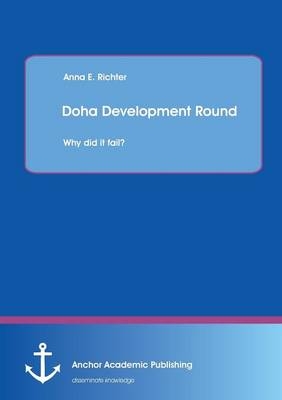
Doha Development Round: Why did it fail?
Anchor Academic Publishing (Verlag)
978-3-95489-317-1 (ISBN)
Anna Richter was born in Heidelberg, Germany in 1991.She grew up in Dresden and La Palma (Canary Islands). After graduating from high-school in Spain, Miss Richter studied Arabic studies at the University of Manchester. She studied and researched for one year at the University of Jordan in Amman and travelled extensively. Besides interning at various government institutions she is currently pursuing her Master s degree in Middle Eastern Economics at the Friedrich Alexander University Nuremberg-Erlangen.
Text Sample:
Introduction:
The Doha Development Agenda (DDA) (commonly referred to as Doha Development Round or simply Doha Round), may go down in history as the slowest development round of all times. Starting in 2001, negotiations have been going on for 13 years and collapsed on several occasions in the meantime. With regards to its goal to ensure developing countries, and especially the least-developed among them, a share in the growth of world trade, barely any progress was made. To the extent that one may question how legitimate it is to call the Doha Round a Development Round at all. Especially the notorious point of trade liberalization in agriculture has delayed the negotiations. While the WTO member states agreed on cutting tariffs and reducing agricultural subsidies, opinions differ sharply on exemptions for certain products from these broad ruled. In another critical point, services, negotiations have hardly progressed. The WTO negotiators have missed every deadline agreed upon and various observers suggested to drop the entire venture. The aim of this paper is to find the reasons for the slow progress in order to see if the obstacles may be overcome and the Doha Round might be completed successfully.
In the first chapter we will have a closer look at the Uruguay Round, the immediate processor of the Doha Round, then, in the second chapter the Doha rounds progress will be analyzed in its key fields, implementation, agriculture, NAMA, services and LDCs. The third chapter is a brief summary of the Bali agreement, the first multilateral agreement of the Doha Round and finally we will evaluate specific obstacles hindering the trade round in chapter 4. In the conclusion our main findings will be presented.
Chapter 1: Pre Doha The Uruguay Round:
The Doha round is now older than the preceding Uruguay round, which lasted almost 8 years and seemed at the time an Odyssey itself. The broad mandate of the Uruguay Round had been to extend the General Agreement on Tariffs and Trade (GATT). Areas previously exempted from international trade rounds, such as textiles and agriculture, since they had been regarded as too difficult to liberalize, were now to be included. Furthermore new topics of increasing importance such as trade in services and intellectual property should be brought to the table. The negotiations, which started in 1986, were completed when the Marrakech Agreement was signed in Morocco in 1994.
Another issue in the Uruguay Round were institutional reforms which led to the creation of the World Trade Organization (WTO). While the demands of developed countries during the Uruguay Round were largely met, mainly by the GATS (General Agreement on Trade in Services) and TRIPS (Trade-related Aspects of Intellectual Property), the demands of developing countries fell short. Even though the GATT member states formally agreed on tariff reductions, a gradual opening up of agricultural markets, as well as a reduction of agricultural subsidies, the implementation of these agreements in developed countries was strongly criticized. Particularly the Agreement on Textiles and Clothing (ATC) and the Agreement on Agriculture had been executed in a manner, as to minimize the liberalization of these strongly protected markets. Developed countries, the EU in particular, have managed to avoid almost all limitations by adjusting the agricultural support mechanisms to fit the WTO boxes, by using technical tricks to avoid the minimum access commitments and by using creative calculation methods in tarrification in order to maintain the high import barriers - a praxis labeled dirty tarrification . With the memory of inadequate or faulty implementation in mind, this was to be a main concern of developing countries in the Doha Round.
| Erscheint lt. Verlag | 11.9.2014 |
|---|---|
| Sprache | englisch |
| Maße | 155 x 220 mm |
| Gewicht | 61 g |
| Themenwelt | Sozialwissenschaften ► Soziologie ► Allgemeine Soziologie |
| ISBN-10 | 3-95489-317-7 / 3954893177 |
| ISBN-13 | 978-3-95489-317-1 / 9783954893171 |
| Zustand | Neuware |
| Haben Sie eine Frage zum Produkt? |
aus dem Bereich


